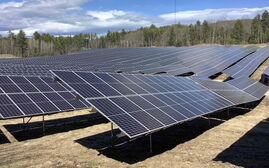
Commentary: Opposing one bill, supporting another, to improve utility performance
Maine has long taken a haphazard approach to energy policy. We've often contemplated big ideas without fully understanding the consequences, allowed complex concepts to become oversimplified notions and retreated to our partisan corners when we can’t agree.

We deregulated Maine’s energy market to varying success. We set precedent and politicized complex policy questions at the ballot box. And we often have to “fix” laws, including Maine’s net energy billing program, because of spiraling costs to ratepayers.
That said, one recent law stands out to me as thoughtful and intentional — LD 1959, the governor’s Utility Accountability Bill, which passed in the last legislative session.
As we planned for the impacts of climate change, and as ratepayers demanded more from their utility companies, our leaders came together, identified priorities, sought feedback and implemented a sweeping new law to ensure our utilities perform to our expectations.
This governor’s bill did many meaningful things, like establishing a utility “performance report card” that would impose financial consequences on Central Maine Power and Versant Power for not achieving customer service and reliability metrics. The first-ever report card is due this spring.
It also required Maine’s utilities to submit Climate Change Protection Plans to the Maine Public Utilities Commission. These plans focus on studying how climate change will affect electric infrastructure assets, and on identifying and developing the resilience measures necessary to protect the grid in the face of more devastating storms.
Now that the governor’s Utility Accountability Bill is law, and as the PUC and utilities work to implement her sweeping reforms, members of the Legislature are now considering a brand-new idea: LD 2172, Performance-Base Rate Design.
Or are they? On first pass, much of this proposed legislation is highly duplicative of LD 1959. It’s also fairly ambiguous, placing more administrative cost, uncertainty and burden on the commission when they already have a lot of work to do.
Just look at the storms that devastated Maine in recent months. We know we need big investments in grid resiliency to address climate change, but this bill will make it harder to do so. It creates regulatory uncertainty by introducing new risk and will make it harder to attract the large amount of capital investment we need at the lowest cost to ratepayers.
These outcomes are the opposite of what we need, and contradict the path forward the governor laid out in her recent State of the State address.
In its current form, and with so much at stake, we must give the Public Utilities Commission time so it can do its job by implementing the laws we already have on the books, including LD 1959.
While I agree we must continue to prioritize urgent action to address climate change, in some cases we must urge patience as many government agencies, companies and organizations work to implement the new laws, policies and regulations.
Maine needs a cohesive energy strategy. Instead, what we have feels like whiplash, as individuals try to advance narrow concepts supporting single issues, or dream up the next big idea. We are faced with big challenges, and we must stay focused on working collaboratively.
We have that opportunity with LD 1959. And rather than passing LD 2172, a law that is so duplicative, the Legislature should allow the PUC the time it needs to do its job.
The fact you believe that the recent storms were caused by man-made catastrophic global warming, which you call “climate change”, discredits every other word you wrote in this opinion piece.














1 Comments